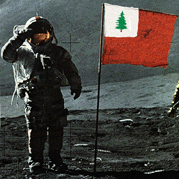 |
TODAY Friday 6 June 1997 Each weekday. Conn Nugent on what's new in the world, on the site. |
newsroom
 |
TODAY Friday 6 June 1997 Each weekday. Conn Nugent on what's new in the world, on the site. |
TODAY IN THE WORLD: Enviros and Transpo
It is customary in the environmental world, and lots of worlds, for different organizations who share a general position on an important issue -- but an issue not so important to the organizations that it defines them -- to come together under the banner of a grand coalition. So we have coalitions on Alaskan wilderness, and clean air policy, and endangered species, and climate, etc., etc., that wax and wane depending on the legislative urgency of their particular cause. Sometimes these coalitions act as disciplined teams, pushing a unitary message. Sometimes they're confederative and loose, little more than hosts for brown-bag lunches where people "go around the table" and inform each other of what's already been decided.
One of the best of these coalitions started loose six years ago and gets tighter and better each day. It is the Surface Transportation Policy Project (STPP), and its job is to educate the public about the benefits -- to the environment, society, and the public health -- of transportation systems not necessarily based on the private automobile. To a remarkable degree, STPP has succeeded in demonstrating to a car-crazed nation that sometimes it makes sense for federal money to help people to walk, ride a bus, or just live near the place where they want to go.
STPP was born in 1991, in the run-up to the re-authorization of the Federal Highway Act. An uneasy federation of enviros, planners, preservationists, and transportation heretics came together to see if the highway bill could be transformed into a funding device for an "intermodal" federal transportation system that forged connections among cars, trucks, buses, trains, bikes, and shoeleather. With a powerful ally in Senator Daniel Patrick Moynihan (may the saints preserve him), the reformers actually won a few things, and what had been the highway bill became ISTEA, the Intermodal Surface Transportation Efficiency Act (pronounced Ice-Tea).
Among the new reforms were two programs that induced states and localities to pursue transportation solutions other than roadbuilding. One was CMAQ, the Congestion Mitigation and Air Quality program (pronounced See-Mack). If a metropolitan area was in violation of the Clean Air Act, local transportation officials had to consider strategies that reduced dependence on single-occupant vehicles. You can imagine how much the two-fisted engineers who had made their careers in state departments of transportation just loved this meddlesome federal do-goodery.
The second big ISTEA reform was the Transportation Enhancements program. Under Transportation Enhancements, you could -- and sometimes had to -- fund bikepaths, and sidewalks, and public art, and landscaping, and the like. And you can imagine how much the engineers liked anything with a name like "enhancements."
Both reforms were resisted mightily in lots of places, and the roadbuilders and the "highway-user" groups (truckers, the AAA) set about building a congressional majority to do away with the namby-pamby intermodal stuff and get back to the business of pouring out eight-lane thoroughfares. ISTEA expires at the end of September, and the Old Guard wanted to reimpose the Old Order (with a slight murmur of protest from a predictably pliant Clinton Administration).
What is interesting -- and what serves as the occasion for this story -- is that the enviros got their act together under the banner of the STPP coalition and fought back. In 1991 you had trouble convincing the national environmental groups that transportation policy was a worthy battle. Two days ago, all the major organizations sent high-level representatives to Washington to push for a new ISTEA, with the two reform programs generously expanded. "No single activity affects our environment more than transportation," said John Adams of the Natural Resources Defense Council. "ISTEA is the most important environmental legislation likely to emerge from the current Congress."
Right on both counts.
TODAY ON THE SITE
For us Americans, at least, tackling transportation is a necessary element of any program to reduce or abate greenhouse gas emissions. Leonie Haimson's Climate Change section of In The Trenches helps set a climate-change context for putative technological breakthroughs in automobile transport.
6/05: Fabulous Ethanol
6/04: Swine and Federalism
6/03: A New Measure
6/02: My Front Yard
5/30: Funders
5/29: Quantification
5/28: Over the Top
5/27: Solar Hippies
5/23: Spiffy Cars, Clunker Bikes
5/22: Petroleum Heresy
5/21: We Irish
5/20: Shallow Backpackers
5/19: Songbirds
5/16: Fat, Fat, Fat
5/15: Our Forthright Administration
5/14: Coral Reefs of the Sahara
5/13: (Life Before) Death and Taxes
5/12: Kids
5/09: Free Trade and Hormones
5/08: Sherry Boehlert, Republican
5/07: Fort Davis, West Texas
5/06: Europe (yawn)
5/05: Divorce, Mothers, Equality
5/02: Killer Grannies and the Highway Bill
5/01: China
4/30: Pity the Mangrove
4/29: Grizzlies off Battery Park
4/28: Mighty Monsanto
4/25: Growth
4/24: Refrigerator Wars
4/23: The Day the Earth Day Stood Still
4/22: Doorman Ecology
4/21: Toyota Steps Out
4/18: Victims of Extremism
4/17: Our White Guy Problem
4/16: Coca-Cola and the Merrit Parkway